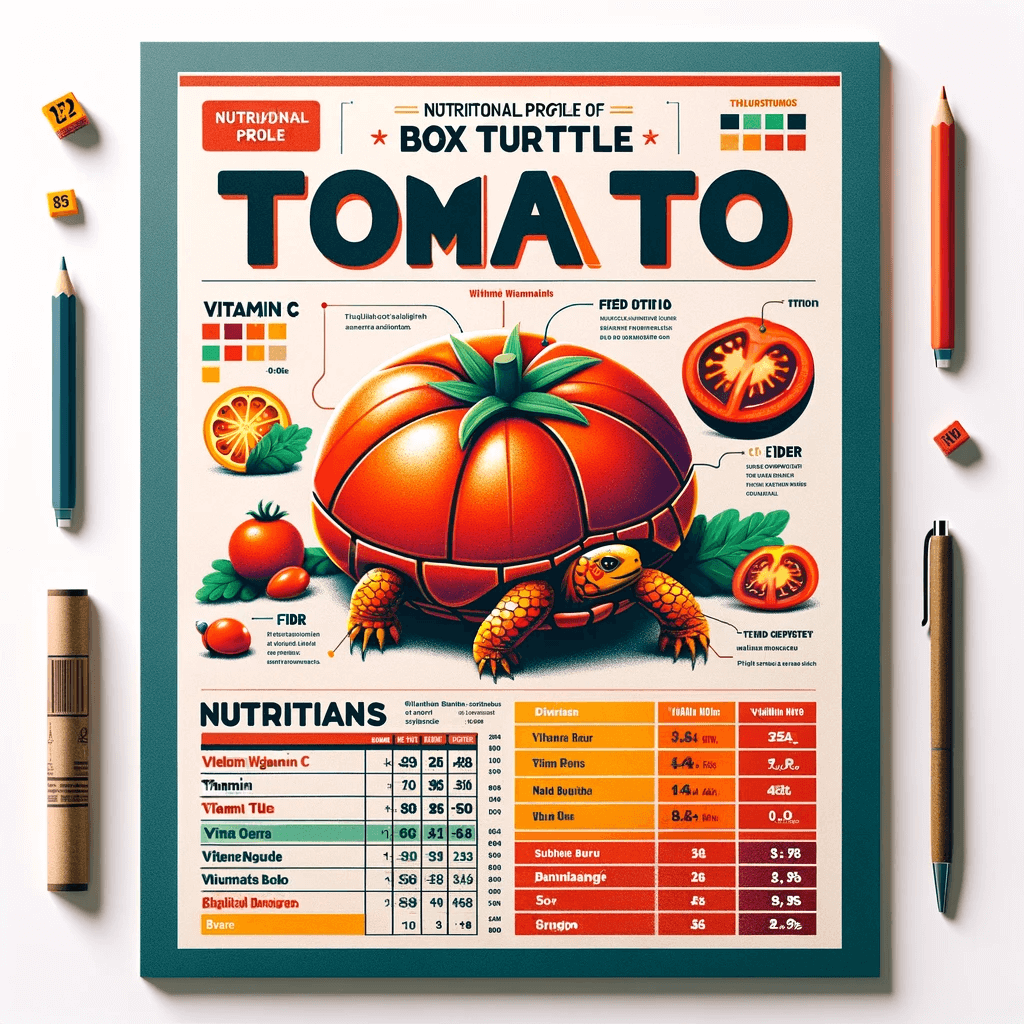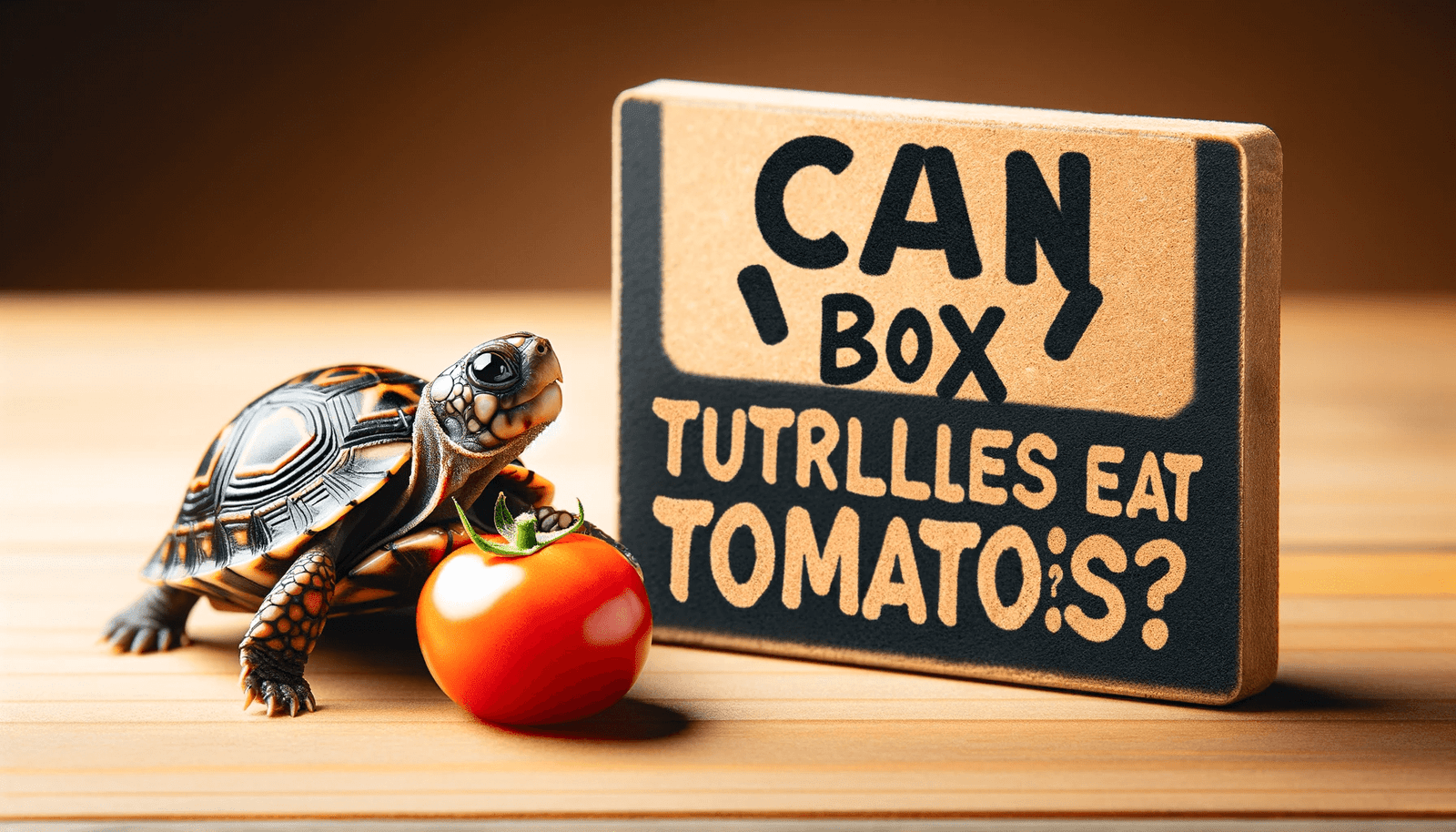As a devoted box turtle owner, ensuring your shelled friend’s diet is nutritious and safe is a top priority. Tomatoes, a common fruit in many human diets, might catch your turtle’s eye, but are they a healthy choice? This guide delves into “Can Box Turtles Eat Tomatoes?”, exploring the potential benefits and drawbacks of incorporating tomatoes into their dietary routine. We’ll examine the nutritional aspects of tomatoes and how they fit into a box turtle’s overall diet, helping you make informed decisions for your pet’s wellbeing.
Can You Feed Tomatoes To Your Pet Turtles?
Tomatoes are rich in vitamins, particularly Vitamin C and antioxidants, which are beneficial for overall health. They also contain a good amount of water, aiding in hydration. However, tomatoes have a high acid content, which can be a concern for turtles if consumed in large quantities. Additionally, the sugar content in tomatoes, while natural, needs moderation to prevent potential health risks like obesity and digestive issues.
For box turtles, tomatoes can be included in their diet, but with caution. The acidic nature of tomatoes means they should be an occasional treat rather than a staple. When feeding tomatoes, ensure they are ripe and free from pesticides, as the chemicals can be harmful to turtles. Removing the seeds is also recommended, as they can be an irritant. In moderation, tomatoes can offer a burst of flavor and nutrition to your box turtle’s diet without the risks associated with overfeeding.

How to Feed Tomatoes to Turtles?:
Feeding tomatoes to box turtles involves careful preparation to ensure it’s safe and beneficial for them. Here’s how to properly include tomatoes in their diet:
- Selection: Choose organic tomatoes to minimize the risk of pesticide exposure. Ensure the tomatoes are ripe, as unripe ones can be more acidic and less nutritious.
- Washing and Preparation: Wash the tomatoes thoroughly under running water. It’s advisable to peel the tomatoes, as the skin can be tough for turtles to digest. Remove the seeds to avoid any irritants.
- Serving Size: Offer small pieces of tomato to your turtle. A segment or two is sufficient for a treat. Avoid making tomatoes a regular part of their daily diet due to the acidity and sugar content.
- Frequency: Given their acidic nature, tomatoes should be an occasional treat for your box turtle, not a daily food item. Feeding tomatoes once every couple of weeks is a good practice.
- Observation: Watch how your turtle reacts to the tomato. Some turtles may eagerly accept it, while others might be hesitant. Adjust the amount and frequency based on your turtle’s preference and health.
By following these guidelines, you can safely introduce tomatoes into your box turtle’s diet, providing them with a tasty and nutritious treat without the risks of overfeeding.

Tomato Nutrition Facts :
Tomatoes offer a range of nutrients beneficial for box turtles. Key components include:
- Vitamin C: Essential for immune system health.
- Vitamin A: Important for vision and skin health.
- Antioxidants: Help in fighting free radicals.
- Water Content: Aids in hydration.
- Dietary Fiber: Promotes digestive health.
- Natural Sugars: Provide energy but should be consumed in moderation.
While tomatoes are nutritious, their acidic nature and sugar content mean they should be fed in moderation as part of a varied diet. Including tomatoes as an occasional treat can enhance your turtle’s diet without risking health issues associated with overfeeding.
Do Box Turtles Like Tomatoes? :
Many box turtles show a natural curiosity towards tomatoes, attracted by their bright color and juicy texture. However, like humans, turtles have individual preferences, and not all may take to tomatoes immediately. Some turtles might be drawn to the soft, moist nature of ripe tomatoes, while others may need time to get used to their taste and acidity.
If your turtle is hesitant to try tomatoes, you can try mixing small pieces of tomato with other foods they enjoy. Gradually introducing tomatoes into their diet can help them become accustomed to the new flavor. Offering a variety of foods, including vegetables and protein sources, along with occasional tomato treats, ensures a balanced diet and reduces the likelihood of picky eating habits.
Overall, while many box turtles enjoy tomatoes as part of their diet, it’s important to respect and cater to your pet’s individual preferences and dietary needs.
Health Risks For Box Turtles Eating Tomatoes :
While tomatoes can be a healthy addition to a box turtle’s diet, there are potential risks associated with their consumption, especially if fed in excess. The primary concerns are the acidity and sugar content of tomatoes.
Acidity: Tomatoes are naturally acidic, which, if consumed frequently or in large quantities, can lead to digestive upset in turtles. This acidity can be especially problematic for turtles with sensitive stomachs or those prone to digestive issues.
Sugar Content: Although tomatoes contain natural sugars, high sugar intake can contribute to health problems in turtles, such as obesity and imbalances in their diet. Turtles do not naturally consume a lot of sugary fruits in the wild, and their bodies are not adapted to high sugar intake.
Nutritional Imbalance: Relying too heavily on any single food item, including tomatoes, can lead to nutritional deficiencies. Turtles require a varied diet that includes a mix of vegetables, fruits, and protein sources to meet all their nutritional needs.
To minimize these risks, it’s important to feed tomatoes in moderation, considering them as an occasional treat rather than a staple in the diet. It’s also crucial to monitor your turtle’s health and behavior when introducing new foods like tomatoes. If you notice any adverse reactions, consult with a veterinarian for advice.
How Much Tomato Should Box Turtles Eat? :
Determining the right amount of tomato for a box turtle depends on various factors, including the turtle’s species, size, age, and overall health. In general, a small piece of tomato, no larger than the size of the turtle’s head, is a safe portion for an occasional treat.
Feeding tomato once every couple of weeks is sufficient for most box turtles. This frequency ensures that the turtle enjoys the benefits of the fruit without the risks associated with overconsumption, such as excessive acidity and sugar intake.
It’s essential to adjust the portion size for younger or smaller turtles and to be more cautious with older or less active turtles, who may be more prone to health issues related to diet. Always consider the turtle’s entire diet to ensure it’s balanced and meets all their nutritional needs.

How Do You Prepare a Tomato Recipe For Turtles? :
Creating a tomato-based recipe for box turtles can be simple and enjoyable. Here’s a basic recipe that combines tomatoes with other turtle-friendly ingredients:
Ingredients:
- 1 small tomato, peeled and seeds removed
- A handful of leafy greens (like romaine lettuce or kale)
- A small piece of carrot, finely chopped
Instructions:
- Chop the tomato into small, bite-sized pieces.
- Combine the tomato pieces with the leafy greens and chopped carrot.
- Offer the mixture to your turtle as a special treat.
This recipe provides a balanced mix of fruit, vegetables, and fiber, offering a range of nutrients beneficial for your turtle. The natural sweetness of the tomato, combined with the nutritional value of greens and carrot, creates a healthy and appealing meal. Remember to adjust the recipe based on your turtle’s size and dietary preferences.
Special Considerations for Baby and Senior Box Turtles :
Baby and senior box turtles have specific dietary needs that should be considered when feeding tomatoes.
Baby Turtles: Young turtles, especially those of carnivorous species, require a diet rich in protein for healthy growth and development. While tomatoes can be offered as a treat, they should not form a significant part of their diet. Focus on providing a balanced diet that includes appropriate protein sources, along with a smaller proportion of fruits and vegetables.
Senior Turtles: Older turtles often have slower metabolisms and may be more prone to weight gain. Consequently, the sugar content in tomatoes can be a concern. For senior turtles, it’s advisable to offer tomatoes less frequently and in smaller portions. Their diet should primarily consist of low-calorie, nutrient-rich foods to maintain their health and prevent obesity.
In both cases, monitoring the turtle’s overall health and dietary response is crucial. Adjustments may be necessary based on individual health conditions and dietary tolerances. Consultation with a veterinarian can provide valuable guidance on the best dietary practices for baby and senior turtles.
Professional Advice :
For box turtle owners considering adding tomatoes to their pet’s diet, it’s advisable to seek professional guidance. Veterinarians and reptile nutrition experts can offer specific recommendations based on the unique needs of your turtle. They can guide you on appropriate portion sizes, the frequency of feeding, and how to balance tomatoes with other dietary components. Professional advice is especially important if your turtle has existing health conditions or dietary sensitivities. By consulting with experts, you can ensure that your turtle’s diet is both nutritious and safe, contributing to their overall health and wellbeing.
Conclusion :
Incorporating tomatoes into a box turtle’s diet can be beneficial when done in moderation. As occasional treats, tomatoes offer a boost of vitamins and hydration. However, it’s important to balance their consumption with other foods to prevent any health issues related to their acidity and sugar content. Always observe your turtle’s response to new foods like tomatoes and adjust their diet accordingly. Consulting with a veterinarian or a reptile nutritionist can provide additional insights and help you make informed dietary choices for your turtle. With careful consideration, tomatoes can be a healthy and enjoyable addition to your box turtle’s diet.
Can I feed my box turtle tomatoes every day?
No, tomatoes should be an occasional treat due to their acidity and sugar content.
Are tomatoes safe for all types of box turtles?
Generally, yes, but it’s best to consult a vet for specific dietary advice.
Can baby box turtles eat tomatoes?
Yes, but only in small amounts as part of a varied diet.
What part of the tomato is safest for box turtles?
The flesh, without seeds and skin, is safest.
How do I introduce tomatoes to my box turtle’s diet?
Start with a small piece and observe their reaction.
What are the signs of overfeeding tomatoes to box turtles?
Digestive upset or changes in appetite can indicate overfeeding.
Can tomatoes be the main part of a box turtle’s diet?
No, they should only be a small part of a varied and balanced diet.

